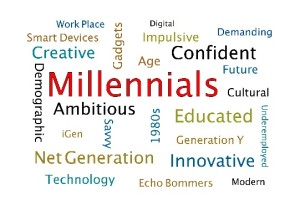
Scenario 1: Ryan walked by Cathy’s work station and noticed she was messaging someone on Facebook. “I hope that’s work related Cathy, you know our rules about using social media at work”. Cathy replies” yes I know the dumb company rules but I have a personal situation with my son that I need to respond to now”.
Scenario 2: Ryan walked by Cathy’s work station and noticed she was messaging someone on Facebook. “Is everything all right Cathy? You usually comply with the company rules about social media use at work”. Cathy replies “you’re right about that Ryan but I do have a personal situation with my son that I need to deal with now”.
Which of these scenarios reflects Ryan acting as a coach leader rather than a manager?
 I present this scenario and ask the question because Millennials, those aged 18 to 34 will outnumber the Boomers in the workplace this year. Their outlook, motivation and needs are different than previous generations according to the experts and studies that have been done.
I present this scenario and ask the question because Millennials, those aged 18 to 34 will outnumber the Boomers in the workplace this year. Their outlook, motivation and needs are different than previous generations according to the experts and studies that have been done.
Coach versus Manager
One of the things that’s important to Millenniums at work is to be coached not managed. This is not something unique to this generation as far as I’m concerned. I am a Boomer and I definitely prefer a coaching style of leadership. I don’t like to be managed.
That brings up the question, what is the difference between coaching and managing?
Coaching signifies development of people while management tends to imply control of people and processes.
There are many things to consider when working to become a coach rather than a manager. In reality however, sometimes a good coach leader needs to also be a manager. It really depends on the situation and the person you are directing.
The more responsible employees are, the less they need to be managed and the more you can coach them. So part of being a good coach leader is to develop people to be great at what they do but also to be responsible and coach-able.
 It seems that the Millennials might think they already are highly responsible and coach-able but this may not always be the case as illustrated in this comic video.
It seems that the Millennials might think they already are highly responsible and coach-able but this may not always be the case as illustrated in this comic video.
A good coach will get to know and understand the motivations and needs of each of his direct reports. This means taking time to meet each person on a regular basis and discuss their performance while also providing opportunities to learn and grow.
A manager however would be more concerned about establishing process, procedures, standards, goals etc and meeting employees to review how they are meeting these performance indicators.
Because companies and organizations need to have some structure, leaders today need to strike a balance between being a coach and a manager. In fact, as Thiagi describes in this video, a leader needs to assume four to five different roles depending on the purpose of a coaching session.
 Going back to the two previous scenarios and my question about which approach by Ryan is more like that of a coach, the answer is neither. In these scenarios Ryan is acting more like a snoopervisor and his only goal is to control and enforce company rules.
Going back to the two previous scenarios and my question about which approach by Ryan is more like that of a coach, the answer is neither. In these scenarios Ryan is acting more like a snoopervisor and his only goal is to control and enforce company rules.
A coach would trust that the person is doing what they need to do as long as they are meeting performance expectations. They wouldn’t even be having that type of conversation.
The best way to coach and manage people especially it seems for Millennials, is to adapt a coaching style of leadership as much as possible. This takes understanding of coaching principles and techniques and taking the time to apply them with each direct report.
Stephen Goldberg
